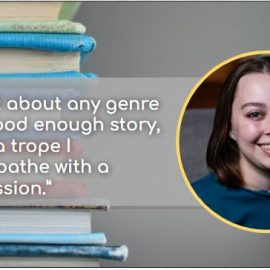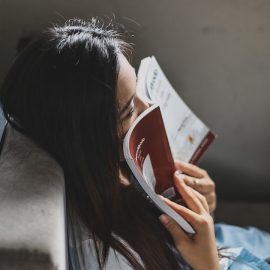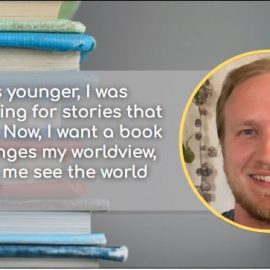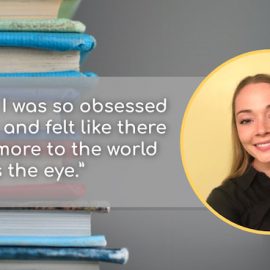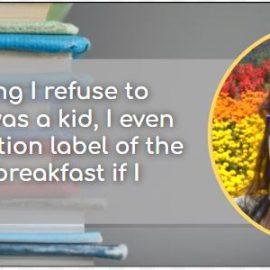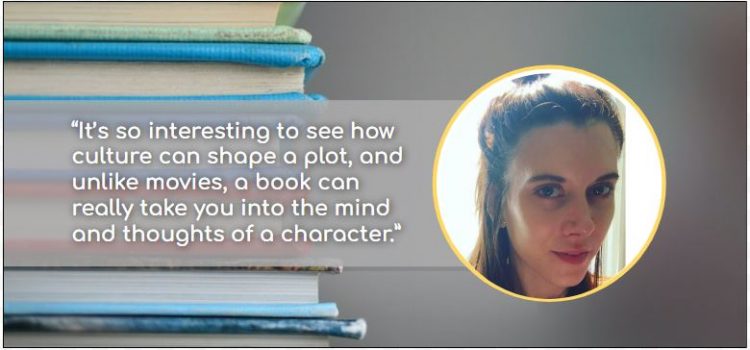
What event sparked Emily’s love for reading at a young age? What book made her rethink how she writes poetry?
Emily is a member of Shortform’s marketing and blog-writing team. Currently located in Colorado, she spent several years of her life in Japan, giving her a wide range of cultural experiences that impact her reading and writing.
Our Interview With Emily
We recently interviewed Emily about her relationship with books, including how her tastes have evolved over the years and who her biggest inspirations are. Here’s our interview with Emily.
What’s your favorite book and why?
This is such a hard question to answer, but there’s really one novel that I know I could read again and again while still feeling the same excitement and intrigue each time I pick it up—The Goldfinch by Donna Tartt.
The first time I read The Goldfinch, I felt a strong connection to the protagonist, Theo. It’s a coming-of-age story about Theo’s life as a young man coping with tragedy. At the time, I was traveling from Japan, where I lived, back home to Florida for a visit with family. In a way, I felt the same emotions Theo endured in the novel—drifting without a sense of home or belonging. It just made the plot of the novel come to life for me. And, Tartt’s writing, which is poetic at times, so beautifully told this story about the struggles of youth and uncertainty.
What’s on your reading list these days?
Well, it’s not my first time reading the book, but I most recently re-read Crime and Punishment by Fyodor Dostoevsky. It kind of has the same draw for me as Tartt’s Goldfinch because of the philosophy of the novel. I really love thinking about the human condition and just what drives people to do what they do. Crime and Punishment definitely takes you on a deep dive into morality—giving the reader a lot to think about even after putting the book down.
What’s your favorite genre? Why does it intrigue you?
It’s not necessarily a genre, but I’m fascinated by books written by authors outside of my own culture. Before I moved to Japan, reading Japanese fiction was what really opened my eyes to some of the unique cultures there. I remember going to my college library to find whatever I could from Haruki Murakami, which is what led me to discover Ryu Murakami and Natsuo Kirino novels.
That section of the University of Central Florida library was deep down in the basement, where it was much quieter than the main floor, and I’d sit down in front of the Japanese literature shelf and just crack open the books that caught my eye. I’m pretty sure I ended up checking out and reading nearly every book in their small-ish collection. It’s so interesting to see how culture can shape a plot. And, unlike movies, a book can really take you into the mind and thoughts of a character.
One of my favorite quotes from Natsuo Kirino’s novel Grotesque: “A woman who does not know herself has no choice other than to live with other people’s evaluations. But no one can adapt perfectly to public opinion. And herein lies the source of their destruction.”
That novel gives a unique glimpse into how some women in Japanese society feel like commodities with their self-worth being based so heavily on appearance. It’s really interesting stuff to think about, and, in reading books from other cultures, I enjoy learning other perspectives on relatable issues, like being a woman in society.
Are there any book genres or tropes that you dislike or refuse to read?
There’s definitely not any genre that I wouldn’t read if I were curious about the book or if it came with a solid recommendation. I don’t know if I should admit this, but I remember reading the Twilight series in college because of all the hype around the novels at the time. They weren’t that great, but they kept me curious!
What’s your favorite way to read a book?
I had a Kindle back around the time they first got popular, but I truly enjoy the physical copy of a book the most. One reason I enjoy reading is that it gets me off a screen. When I feel like I’ve spent too much of my day staring at laptop or phone screens, it feels nice to open a book instead. Bringing a book outdoors to read, like to a park or really anywhere natural and quiet, is the ideal setting for me. Otherwise, you can’t beat curling up under the covers to read on a cold, rainy day.
How have your reading tastes changed over the years?
In high school, just like everyone else, we were assigned to read a lot of American classics—Twain or Fitzgerald, for example. I enjoyed them, but, maybe because I was reading them for a grade in class, I ended up shying away from that kind of literature when it came to choosing books to read in my free time. Lately, though, I’ve been wanting to revisit that genre. I picked up A River Runs Through It not too long ago just because I was craving that setting of rural, small-town America.
Was there a specific book that sparked your love of reading?
What sparked my love of reading wasn’t one book but the book events our local library held when I was a kid. The Scholastic Book Fair, for example, was, like, the best thing ever!
When I was little, getting to choose my own books to read felt so exciting. I remember how it felt like I was in a candy store, choosing from all of the fun, colorful books. We would also get prizes for reading and showing that we comprehended the books we chose. Thinking back to those times still gives me that “kid on Christmas morning” kind of feeling about the books and going to a book fair.
What’s your favorite quote from a book or an author?
Tartt’s The Goldfinch has so many profound quotes to choose from, but I remember reading this quote for the first time and physically feeling the words, almost like a shock to my system:
“But sometimes, unexpectedly, grief pounded over me in waves that left me gasping; and when the waves washed back, I found myself looking out over a brackish wreck which was illumined in a light so lucid, so heartsick and empty, that I could hardly remember that the world had ever been anything but dead.”
It’s such a succinct yet beautiful description of grief. I’m in love with the raw emotion Tartt captures in her writing.
At Shortform, how do you go about working on a book that has viewpoints you don’t agree with?
Not just in my work, but in my life, too, I try to be aware of my personal biases. I think having that awareness can help you let go of negative emotions, like fear or anger, and it helps strengthen empathy. My approach to a book that might challenge my biases is similar to how I try to think about the world and treat people—we’re all just trying our best to make sense of existence, and life inevitably influences our perceptions. It’s better to share and try to understand different points of view because each one is valid to someone.
Are there any books you had to read for Shortform that you thought you wouldn’t like and ended up loving?
I recently blogged for The Sun and Her Flowers by Rupi Kaur. To be honest, I was hesitant about the book only because it’s a collection of poems, which was new to me in terms of blogging. I thought it would be more challenging. In fact, I ended up really enjoying Kaur’s poetry, which is simple but strong. It inspired me to rethink how I write my poetry. The illustrations in the book are also unique and beautiful.
What are your favorite books in the Shortform library and why?
There are so many books the Shortform library has introduced me to that I otherwise wouldn’t have known about. In fact, my favorite is the very first book guide I read from Shortform—The Art of Happiness by the 14th Dalai Lama and Howard Cutler. A lot of the concepts in that book align with how I’ve come to think about life, happiness, and existence in general, but the book helped me solidify that philosophy in a much clearer way. When I’m introducing someone to Shortform, that’s the book guide I always recommend they start with if they’re not sure where to begin.
Emily’s Recommended Reading List
- The Goldfinch by Donna Tartt
- The Sun and Her Flowers by Rupi Kaur
- The Art of Happiness by the Dalai Lama and Howard Cutler
About the Series
At Shortform, we want to give our employees names and faces so you can get to know the people who make the magic happen. That’s why we’re doing the Shortform Reads series, where we interview our employees and share their thoughts and opinions. You can check out more employee interviews here.

